| Listing 1 - 10 of 17 | << page >> |
Sort by
|
Periodical
Publisher: Washington, DC : National Assessment Governing Board, U.S. Department of Education
Abstract | Keywords | Export | Availability | Bookmark
 Loading...
Loading...Choose an application
- Reference Manager
- EndNote
- RefWorks (Direct export to RefWorks)
Civics --- Study and teaching --- Ability testing --- NAEP Civics Consensus Project
Book
Year: 2004 Publisher: [Washington, DC] : U.S. Dept. of Education, Institute of Education Sciences,
Abstract | Keywords | Export | Availability | Bookmark
 Loading...
Loading...Choose an application
- Reference Manager
- EndNote
- RefWorks (Direct export to RefWorks)
Mathematics --- Mathematical ability --- Urban schools --- Educational tests and measurements --- Study and teaching (Elementary) --- Evaluation. --- Testing --- Study and teaching (Elementary) --- NAEP Trial Urban District Assessment.
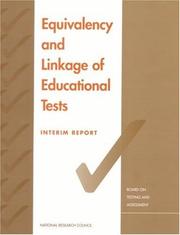
ISBN: 0309061776 9786612081743 1282081748 0309522609 0585339538 9780585339535 6612081740 9780309061773 0305061776 9781282081741 9780309522601 Year: 1998 Publisher: Washington, D.C. National Academy Press
Abstract | Keywords | Export | Availability | Bookmark
 Loading...
Loading...Choose an application
- Reference Manager
- EndNote
- RefWorks (Direct export to RefWorks)
Educational tests and measurements --- Interpretation. --- National Assessment of Educational Progress (Project) --- NAEP --- Education Commission of the States. --- Educational Testing Service. --- National Center for Education Statistics. --- Exploratory Committee on Assessing the Progress of Education --- Committee on Assessing the Progress of Education --- Evaluación Nacional del Progreso Educativo --- Center for the Assessment of Educational Progress (Educational Testing Service).
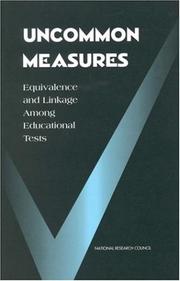
ISBN: 0309062799 9786612081927 1282081926 0309524989 0585054002 9780585054001 9780309062794 0309173485 Year: 1999 Publisher: Washington, D.C. National Academy Press
Abstract | Keywords | Export | Availability | Bookmark
 Loading...
Loading...Choose an application
- Reference Manager
- EndNote
- RefWorks (Direct export to RefWorks)
Educational tests and measurements --- Interpretation. --- National Assessment of Educational Progress (Project) --- NAEP --- Education Commission of the States. --- Educational Testing Service. --- National Center for Education Statistics. --- Exploratory Committee on Assessing the Progress of Education --- Committee on Assessing the Progress of Education --- Evaluación Nacional del Progreso Educativo --- Center for the Assessment of Educational Progress (Educational Testing Service).
Book
Year: 2021 Publisher: Basel, Switzerland MDPI - Multidisciplinary Digital Publishing Institute
Abstract | Keywords | Export | Availability | Bookmark
 Loading...
Loading...Choose an application
- Reference Manager
- EndNote
- RefWorks (Direct export to RefWorks)
Reading fluency has been identified as a key component of proficient reading. Research has consistently demonstrated significant and substantial correlations between reading fluency and overall reading achievement. Despite the great potential for fluency to have a significant outcome on students’ reading achievement, it continues to be not well understood by teachers, school administrators and policy makers. The chapters in this volume examine reading fluency from a variety of perspectives. The initial chapter sketches the history of fluency as a literacy instruction component. Following chapters examine recent studies and approaches to reading fluency, followed by chapters that explore actual fluency instruction models and the impact of fluency instruction. Assessment of reading fluency is critical for monitoring progress and identifying students in need of intervention. Two articles on assessment, one focused on word recognition and the other on prosody, expand our understanding of fluency measurement. Finally, a study from Turkey explores the relationship of various reading competencies, including fluency, in an integrated model of reading. Our hope for this volume is that it may spark a renewed interest in research into reading fluency and fluency instruction and move toward making fluency instruction an even more integral part of all literacy instruction.
curriculum-based measurement --- fluency --- silent reading --- word recognition skills --- item response theory --- interventions --- oral reading fluency --- reading comprehension --- reading difficulties --- systematic review --- struggling readers --- reading motivation --- learning support --- socioeconomic status --- reading intervention --- reading fluency --- prosody --- NAEP --- MDFS --- spectrographic measurement --- KAPS model --- comprehension strategy use --- background knowledge --- repeated reading --- wide reading --- challenging texts --- oral reading --- academic achievement --- comprehension --- reading --- fluency development lesson
Book
Year: 2021 Publisher: Basel, Switzerland MDPI - Multidisciplinary Digital Publishing Institute
Abstract | Keywords | Export | Availability | Bookmark
 Loading...
Loading...Choose an application
- Reference Manager
- EndNote
- RefWorks (Direct export to RefWorks)
Reading fluency has been identified as a key component of proficient reading. Research has consistently demonstrated significant and substantial correlations between reading fluency and overall reading achievement. Despite the great potential for fluency to have a significant outcome on students’ reading achievement, it continues to be not well understood by teachers, school administrators and policy makers. The chapters in this volume examine reading fluency from a variety of perspectives. The initial chapter sketches the history of fluency as a literacy instruction component. Following chapters examine recent studies and approaches to reading fluency, followed by chapters that explore actual fluency instruction models and the impact of fluency instruction. Assessment of reading fluency is critical for monitoring progress and identifying students in need of intervention. Two articles on assessment, one focused on word recognition and the other on prosody, expand our understanding of fluency measurement. Finally, a study from Turkey explores the relationship of various reading competencies, including fluency, in an integrated model of reading. Our hope for this volume is that it may spark a renewed interest in research into reading fluency and fluency instruction and move toward making fluency instruction an even more integral part of all literacy instruction.
Language --- curriculum-based measurement --- fluency --- silent reading --- word recognition skills --- item response theory --- interventions --- oral reading fluency --- reading comprehension --- reading difficulties --- systematic review --- struggling readers --- reading motivation --- learning support --- socioeconomic status --- reading intervention --- reading fluency --- prosody --- NAEP --- MDFS --- spectrographic measurement --- KAPS model --- comprehension strategy use --- background knowledge --- repeated reading --- wide reading --- challenging texts --- oral reading --- academic achievement --- comprehension --- reading --- fluency development lesson --- curriculum-based measurement --- fluency --- silent reading --- word recognition skills --- item response theory --- interventions --- oral reading fluency --- reading comprehension --- reading difficulties --- systematic review --- struggling readers --- reading motivation --- learning support --- socioeconomic status --- reading intervention --- reading fluency --- prosody --- NAEP --- MDFS --- spectrographic measurement --- KAPS model --- comprehension strategy use --- background knowledge --- repeated reading --- wide reading --- challenging texts --- oral reading --- academic achievement --- comprehension --- reading --- fluency development lesson
Periodical
ISSN: 00340472 14679345 Year: 1967 Publisher: Sunderland United Kingdom Reading Association
Abstract | Keywords | Export | Availability | Bookmark
 Loading...
Loading...Choose an application
- Reference Manager
- EndNote
- RefWorks (Direct export to RefWorks)
Adult education. Lifelong learning --- Sociology of cultural policy --- Reading --- Lecture --- Periodicals. --- Périodiques --- 05.15 reading --- Arts and Humanities --- Education & Careers --- Language & Linguistics --- Reading. --- Study and teaching --- Language arts --- Elocution --- National Assessment of Educational Progress (Project) --- NAEP --- Education Commission of the States. --- Educational Testing Service. --- National Center for Education Statistics. --- Evaluación Nacional del Progreso Educativo --- Center for the Assessment of Educational Progress (Educational Testing Service). --- Committee on Assessing the Progress of Education
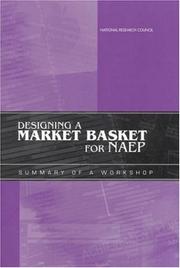
ISBN: 0309071283 0309514738 9780309514736 9780309071284 0305071283 0309183839 9780309183833 Year: 2000 Publisher: Washington, D.C. National Academy Press
Abstract | Keywords | Export | Availability | Bookmark
 Loading...
Loading...Choose an application
- Reference Manager
- EndNote
- RefWorks (Direct export to RefWorks)
Education --- Educational tests and measurements --- Evaluation --- National Assessment of Educational Progress (Project) --- Children --- Education, Primitive --- Education of children --- Human resource development --- Instruction --- Pedagogy --- Schooling --- Students --- Youth --- NAEP --- Education Commission of the States. --- Educational Testing Service. --- National Center for Education Statistics. --- Civilization --- Learning and scholarship --- Mental discipline --- Schools --- Teaching --- Training --- Exploratory Committee on Assessing the Progress of Education --- Committee on Assessing the Progress of Education --- Evaluación Nacional del Progreso Educativo --- Center for the Assessment of Educational Progress (Educational Testing Service).
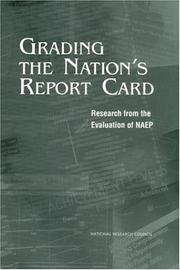
ISBN: 0309068444 0309515572 0585238502 9780585238500 9780309068444 0305068444 0309172322 Year: 2000 Publisher: Washington, D.C. National Academy Press
Abstract | Keywords | Export | Availability | Bookmark
 Loading...
Loading...Choose an application
- Reference Manager
- EndNote
- RefWorks (Direct export to RefWorks)
Educational tests and measurements -- United States. --- National Assessment of Educational Progress (Project) -- Evaluation. --- Educational tests and measurements --- National Assessment of Educational Progress (Project) --- Evaluation. --- NAEP --- Education Commission of the States. --- Educational Testing Service. --- National Center for Education Statistics. --- Exploratory Committee on Assessing the Progress of Education --- Committee on Assessing the Progress of Education --- Evaluación Nacional del Progreso Educativo --- Center for the Assessment of Educational Progress (Educational Testing Service).
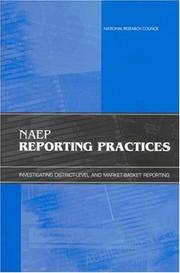
ISBN: 0309073138 0309502578 9780309502573 9780309073134 0309076749 9780309076746 0309183162 Year: 2001 Publisher: Washington, D.C. National Academy Press
Abstract | Keywords | Export | Availability | Bookmark
 Loading...
Loading...Choose an application
- Reference Manager
- EndNote
- RefWorks (Direct export to RefWorks)
Educational tests and measurements --- Achievement tests --- Evaluation. --- National Assessment of Educational Progress (Project) --- Scholastic achievement tests --- School achievement tests --- NAEP --- Education Commission of the States. --- Educational Testing Service. --- National Center for Education Statistics. --- Academic achievement --- Examinations --- Exploratory Committee on Assessing the Progress of Education --- Committee on Assessing the Progress of Education --- Evaluación Nacional del Progreso Educativo --- Center for the Assessment of Educational Progress (Educational Testing Service).
| Listing 1 - 10 of 17 | << page >> |
Sort by
|

 Search
Search Feedback
Feedback About UniCat
About UniCat  Help
Help News
News